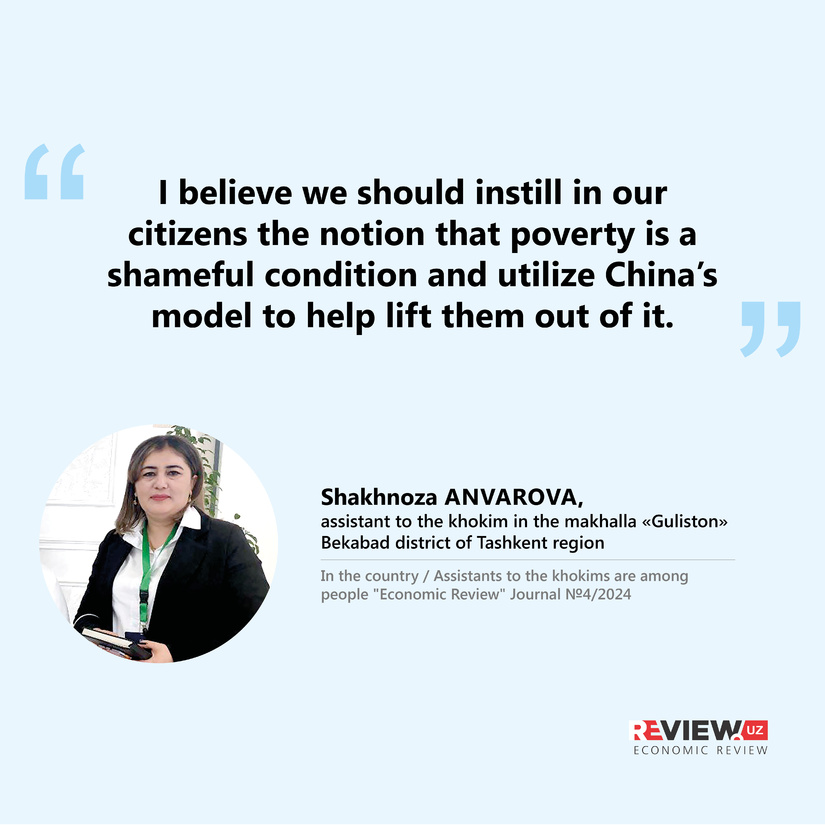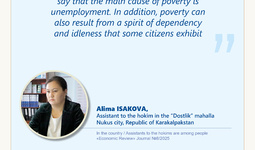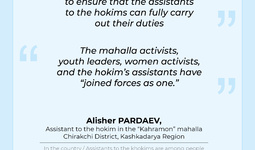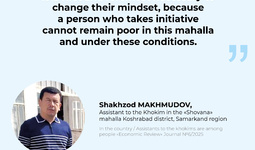— In our country, the "makhallabay" system was introduced for the first time. What is the nature of this position for you, how do you see and understand it?
– This position was created at the initiative of the President and introduced to ensure the interests of the people and ease their burden. The hokim may not be able to reach every makhalla, but his assistants on the ground have information about the problems of all households in the makhalla, which allows them to identify shortcomings and solve people's problems in a shorter time, without unnecessary paperwork. This certainly makes citizens feel grateful to the state. All our work as assistants to the hokims is done to ensure human dignity.
— Tell us more about yourself and how you came to this position. How familiar were you with the work of the makhalla before, where you are now an assistant to the khokim? What is your past work experience that allows you to solve the tasks assigned?
– I started my work in January 2022. Before that, I worked at the Zafar branch of Xalq Bank in Bekabad district. Having learned that there was a vacancy for an assistant hokim in Guliston district, I applied for the position. My previous work experience helps me in communicating with citizens. In addition, it was also useful that I was born and raised in this mahalla. Since I previously worked in the field of economics, it was very helpful for me to apply my previous experience in my work, in particular the Chinese experience in combating poverty.
– Tell us in detail about your makhalla. Where is it located, what is its size, what large enterprises are there for the work of residents of the makhalla, what types of activities are mainly engaged in by local people? What kind of social infrastructure facilities are there in the makhalla?
– The makhalla is located in the city of Zafar, the center of the Bekabad district, and consists mainly of multi-storey buildings. The service sector is the driver of the regional economy. There is one school and 2 preschool institutions in the makhalla, 5 bakeries, more than 25 catering establishments and 15 small manufacturing enterprises. Most of the population works here, as well as in organizations and institutions of the city.
— What social groups of the population are in the majority in the makhalla, how many poor people and those in need of social protection are there? How developed is entrepreneurship? Is it possible to show the "social portrait" of your makhalla with the help of figures?
— The total number of households in the makhalla is 738, with 3756 people living there, and the number of families is 1015. Of these, 100 families are in the 1st category; 885 are in the 2nd category; 30 are in the 3rd category. The number of citizens included in groups in need of social assistance is 40. At the moment, 66 unemployed people have been identified. A specific action plan has been developed to provide targeted assistance to citizens in need of assistance, and planned work is currently underway to implement it.
— How did you establish communication with the residents of the makhalla?
— As soon as I started working in my makhalla, I created a group in the Telegram app. All citizens living in this makhalla became its members. Every day, together with active citizens, we discuss the problems of the makhalla and exchange ideas on how to solve them. People have the opportunity to communicate through the Telegram group even if they cannot come to the makhalla office in person. In addition, I got to know my makhalla better by holding round tables with local activists about its problems and achievements.
— As an assistant to the hokim, you have conducted a number of studies and surveys in your makhalla. Could you describe their results in more detail, what did you find?
— Of course, we started our work with a thorough study on the ground. As an assistant to the hokim, I conducted an online survey in the makhalla's Telegram group called "What problems are you worried about?" The results of the survey showed that it was necessary to equip playgrounds, install video surveillance systems, and improve street lighting. Practical work on resolving these issues is currently ongoing. In general, many issues are taken under control and resolved by responsible persons in the course of continuous interaction with the population.
— Can you tell us, based on the research and studies conducted, what are the main causes of poverty among the residents of the makhalla? What approaches have you developed to overcome them and solve existing problems?
— According to the information obtained from the survey, despite the creation of a large number of jobs in the makhalla, the level of wages does not satisfy citizens. Most residents live in prosperous families, and most of them work in government agencies. During my work, I managed to provide 30 unemployed citizens from the "Women's Notebook" with equipment totaling 90 million sums. Now these people have become self-employed and contribute to the budget of their families.
— Tell us, what work has been done in terms of social support for the residents of the makhalla?
— Together with the chairman of the makhalla, women activists, and youth leaders, a "Roadmap" was developed for joint work with the unemployed and those in need of social protection, to provide them with assistance. Based on the "Roadmap", unemployed citizens in need of social protection were trained in professions at Monocenters during the year, and they were assisted in purchasing equipment based on subsidies and soft loans.
— Based on your experience, tell us what are the reasons for the recorded cases of poverty in the makhalla? In your opinion, what else needs to be done to reduce poverty in the makhalla?
— As a result of the survey, it became clear that 66 people are facing unemployment problems. These citizens have been trained in various professions and are now completing the educational process in this direction. I believe that we should convey to our fellow citizens the idea that poverty is a shameful phenomenon and use the experience of China to get them out of this situation. I support helping those people who are trying to provide for their families, not those who just sit at home waiting for help.
— The availability and condition of transport, energy, communal, social and other infrastructure is important for the sustainable development of the makhalla. How would you describe the problems in this area in your makhalla? What are you doing to solve them and improve the makhalla?
— Since the makhalla is located in the center of the Bekabad district, there are no problems with gas, electricity, and water. Citizens are also very active in landscaping, every weekend we organize a "hashar" (community work day), we try to make the territory where we live more beautiful and comfortable. In addition, an important role is played by the fact that our state in recent years has been paying great attention to the socio-economic development of Uzbekistan, and the fact that huge funds are allocated for this work.
— What are the main "growth points" that can best ensure the economic development of your makhalla?
— As mentioned above, the makhalla specializes in entrepreneurship and the service sector, and most residents work in this area. Also, one of our goals today is to create additional jobs by developing the manufacturing sector. The makhalla has the necessary infrastructure for this.
— The "makhallabay" system implies close cooperation of all levels of government bodies in solving problems that cannot be solved at the local level. Have there been such cases in your practice? Give specific examples of solving this problem.
— The makhalla is located in the 2nd sector, and we work closely with the prosecutor's office of the Bekabad district. For example, as a result of a fire, a house at 43 Sabir Rakhimov Street was completely burned down. Under the leadership of the head of the sector, practical assistance was provided in restoring the housing and improving the social situation of the homeowner. Low-income families are given food. Also, our citizens who have been prosecuted and have served their sentences are provided with practical assistance until they can get back on their feet, based on a joint decision.
— Today, our country is waging a fierce fight against any form of corruption. What are you doing to prevent corruption in your activities?
— The salary paid by the state and the prosperity in my family leave no room for corruption. As a public servant, I feel disgusted with such things. I also dissuade our citizens who have chosen this path from it. In addition, reports on the work done and the funds spent are constantly compiled before the deputies and residents of the makhalla. This, in turn, helps prevent corruption.
— What has changed in the makhalla during your activity, how do residents feel about this? Has trust in the institution of assistant hokims and the "makhallabay" system as a whole increased? Tell us about your plans for the future.
— During my activity, 25 new business entities have been created, where our unemployed citizens are provided with jobs. Of course, the residents see this. It is especially pleasant to hear them say: "Before, we spent our whole lives at the door of offices to get a loan and start a business, then the assistant hokims came and we started our business without difficulties." The main thing is to benefit the people.
At the same time, a small garden was laid out on the abandoned land in the makhalla under the motto "My makhalla is my garden." I will work hard in the position entrusted to me and will definitely justify the trust placed in me by our President and our people.
Jamoliddin Turdimov, CERR
"Economic Review" Journal №4/2024





















leave a comment